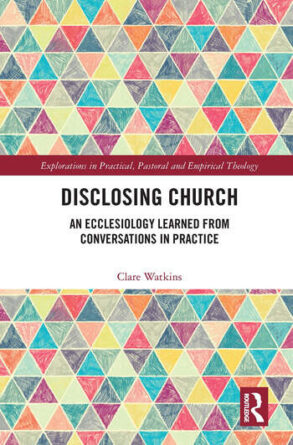Claire Watkins: Disclosing Church
Claire Watkins: Disclosing Church: An Ecclesiology Learned from Conversations in Practice, Explorations in Practical, Pastoral, and Empirical Theology, London: Routledge, 2020, 282 S., € 36,99, E-book ISBN 978-1-315-14253-1, Pb. ISBN 978-1-032-23786-2
What happens when we read our practice of doing church by listening to those who serve on the edges of church in evangelism and ‘worldly’ service, as witnesses to the work of the Holy Spirit? Claire Watkins sets out to accomplish this central task in this landmark study in practical ecclesiology.
Watkins is a Roman Catholic practical theologian, teaching at the University of Roehampton, UK. She collaborated in the ecumenical Action Research Church and Society (ARCS) project (2006–2010), doing action research with two interdisciplinary research centers and 12 organizations. This resulted earlier in Talking about God in Practice (2010). Disclosing Church is the latest fruit.
In unravelling the dynamics of human and divine action, practical theology often takes a correlational approach. Watkins proposes an alternative route, based on action research. The ARCS team approached local churches and organizations to explore questions arising from their evangelism and social engagement. These questions focused on beliefs and theology that were (implicitly) embedded in their practices. After initial agreement, researchers conducted interviews with volunteers as well as the ‘guests’ (beneficiaries) of these activities. Findings were discussed with all groups (researchers, volunteers, guests), leading to epiphanic moments where a significant ‘truth’ broke through in the midst of conversations, not so much by rational deduction, but by being attentive to the Spirit’s work in these practices. Watkins proposes that this is a whole-theological, fundamental practical theology.
This action research features conversations as its core method, in a mode of ‘faith seeking understanding’. It raises questions about theological epistemology, critiquing modern, rational ways of knowing and taking personal spirituality and communal accounts of reality seriously. The four theological voices model (operant, espoused, normative, formal) resulted from these conversations as an account of “the various loci of theological authority” (39) in these practices. It was an attempt to interpret the ways in which theological authority is embedded in practice.
The book is built around seven “accounts of practice” of Anglican and Roman Catholic initiatives in London: Jesuits serving marginalized people, faith formation in Westminster, Alpha course participants (not) in church, making disciples in Messy Church, churches as homeless shelters, mobilizing lay people, and overcoming poverty. Each account tells how the organization collaborated with the ARCS team, followed by five “disclosures” or close observations of each situation.
These disclosures feed into further reflections. Two chapters focus on context. The geographical context is London, post-secular and religiously diverse, full with isolation and inequality, where hospitality and inclusiveness are a treasured gift. The organizational context is the complex interaction between bishop, priest, parish, volunteers and guests.
Five chapters focus on ecclesiological themes. First, the church is learning to move away from the ecclesial center into mission to the world. Second, the church is edgeless as divine grace overflows to those outside its structures. Third, the sacramental focus of the liturgy broadens to include Christ’s presence in fellowship meals and other ‘edgy’ ministries. Fourth, church authority is institutionally framed, but also practically experienced in the Spirit’s empowerment for ‘edgy’ ministry. Fifth, church tradition becomes an empowering gift to be appropriated and adapted experientially.
Watkins concludes with the hope that this research will contribute to theological and practical renewal in ecclesiology. Her goal is not a “final ecclesiology,” but to open up conversation about ongoing church development with an epiphanic vision of the journey of faith (227). Hence, theology remains fundamentally practice-engaged.
This book is a fruitful, rewarding study of church in practice. Its engagement with Anglican and Roman Catholic communities is evident, but the lessons learned stretch far beyond their original context. With 14 chapters and 7 case studies, the book is slow reading for those who wish to savour the process of observation and analysis. Yet, it is rewarding to read not just the final result but to join the process of discovery.
Prof. Dr. Jack Barentsen, Professor of Practical Theology, Evangelische Theologische Faculteit, Leuven (Belgium)
